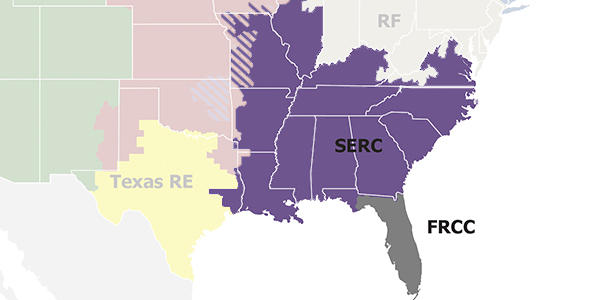FERC OKs SERC’s Expansion into Florida
By Rich Heidorn Jr.
FERC on Wednesday approved the dissolution of the Florida Reliability Coordinating Council as a regional entity and SERC Reliability’s expansion into the Sunshine State (RR19-4).
FRCC agreed in October 2018 to relinquish its role following NERC’s determination that its REs — which are deputized to police reliability — should be separate from registered entities subject to NERC reliability standards.
In addition to serving as an RE, Tampa-based FRCC also has a Member Services division, which served as a reliability coordinator and planning authority. FRCC will continue to serve in those functions. “FRCC staff and members will continue to steadfastly pursue our vision to maintain a highly reliable and secure bulk power system for peninsular Florida,” CEO Stacy Dochoda said in a press release.
SERC, based in Charlotte, N.C., is expected to take over FRCC’s RE responsibilities July 1, with FRCC completing its “wind down” of those services by Aug. 31.
Some 37 registered entities in peninsular Florida east of the Apalachicola River will move to SERC, including large utilities Tampa Electric, Florida Power & Light and Duke Energy Florida and small municipal utilities serving Key West and the city of Bartow. (SERC already serves the panhandle west of the Apalachicola.)
SERC is revising its bylaws to expand its Board Executive Committee from 12 to 15 members and divide committee members into two groups with staggered, two-year terms.
SERC expects to add 17 to 21 full-time equivalent staff members to handle the increased workload. NERC and the two REs will use FRCC’s available cash as of July 1, its third and fourth quarter 2019 assessments, and a possible special assessment of up to $630,000 to fund the transition.
FERC also approved a request to allow use of any FRCC penalty funds submitted to NERC between July 1, 2018, and July 1, 2019, toward the transition costs. Penalties submitted between July 1 and Dec. 31 or not otherwise applied to the transition will be reimbursed to FRCC entities on a pro rata basis.
Answering Questions
SERC, which will hold its regular second-quarter “Open Forum” webinar at 2 p.m. May 6, has published a list of frequently asked questions on the transition.
Last year, SERC reorganized from five to six subregions: SERC PJM; SERC MISO-Central; SERC MISO-South; SERC Central (the Tennessee Valley Authority RC area); SERC South (the Southern Co. RC area); and SERC East (the VACAR South RC area).
SERC has one regional standard, PRC-006-SERC-02, governing automatic underfrequency load shedding requirements. SERC said it agreed with FRCC’s recommendation that Florida entities seek a compliance exception from the standard, saying “such action would be the simplest to allow time for the FRCC entity system to be included.”




